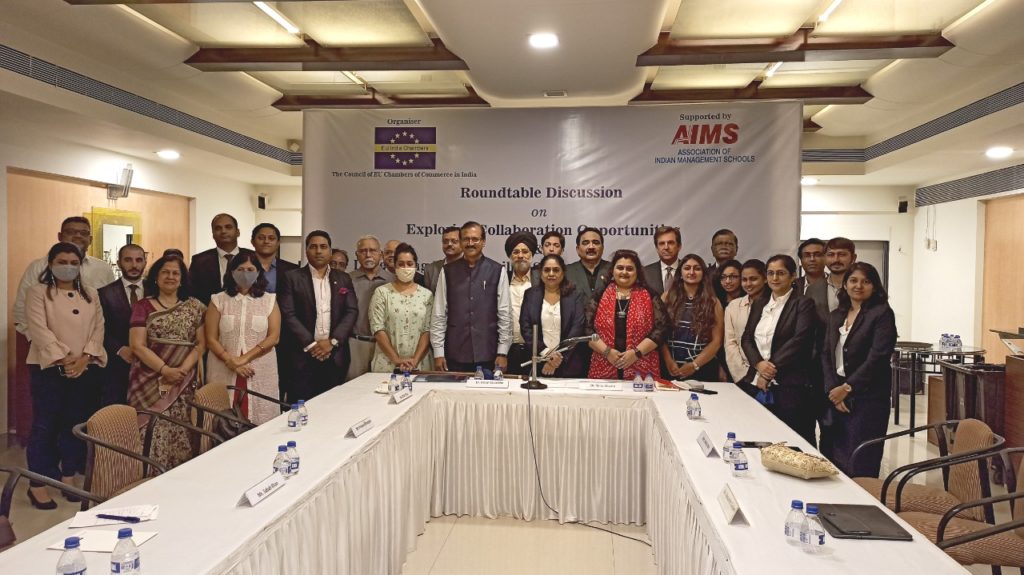The Council of EU Chambers of Commerce in India organized “Roundtable on Exploring Collaboration Opportunities and developing employability skills for European Markets” on 22nd October, 2021 at Y.B. Chavan Centre, Nariman Point, Mumbai
The Council of EU Chambers of Commerce in India (EU Chambers) under the aegis of Education Committee successfully organized a Roundtable Discussion on “Exploring Collaboration Opportunities and Developing Employability Skills for European Markets” on 22nd October, 2021 at Y.B. Chavan Centre, Nariman Point, Mumbai.
The distinguished dignitaries present at the Roundtable Discussion were Ms. Anna Lekvall, Consul General, Consulate General of Sweden, Mumbai, Dr. Mike Paul, Commercial Attaché, Consulate General of Hungary, Mumbai, Mr. Pranava Bhargava, Head of Chancery, Honorary Consulate of Finland, Ms. Sabah Khan, Assistant Manager, Honorary Consulate of Latvia. The education committee members were Chairman, Dr. Uday Salunkhe, Group Director, Prin. L.N. Welingkar Institute of Management Development & Research, Co-chairman, Mr. T M Sathyanarayanan, Director, Overseas Education Consultancy Services, Mr. Asslam Shaikh, Aliff Overseas, Mr. Alessandro Giuliani, SDA Bocconi Asia Center, Dr. David Easow, Hindustan Institute, Mrs. Vanita Vyas, Swift Edutech Solution Pvt. Ltd, Dr. Vijay Khole, Former Vice Chancellor, Mumbai University and Dr Ajit Singh, President, Association of Indian Management Schools.
Dr. Renu Shome welcomed all the guests by introducing the Chamber and thanked Dr Ajit Singh to sponsor the event.

Dr. Uday Salunkhe, Chairman, Education Committee talked about the importance of developing the skills for further collaborations. Taking the discussion forward he shared some insights about higher education in India. He mentioned that higher education in India has not understood the significance of status quo and the risks of the status quo. It is high time for our higher education institutions to gear up and probably leverage these trends for the future of themselves as well as global market place. At the Education Committee of EU Chamber, we are looking forward for a win-win situation; it is a very good platform of opportunities for the Indian side as well as the European side. India is always looking further to gain advantage with other countries, but the percentage might differ as the requirements of those countries would be smaller as compared to ours. One of the major reasons for India is definitely its human capital. Today as the world is poised, with the turn around with the last one and half years pandemic situation and multiple other challenges in the global market, the actual market needs English speaking human capital, digital savvy human capital from India. Moreover, that should be one of the visions.
Further, he talked about how we can make our institutions; universities realize the significance of investment before returns is greater than ROI. Probably we ourselves as institution leaders and policy makers need to make our people understand that investing on the younger generation will be of greater significance and the world will be there for you. Later he also discussed a few aspects in terms of upcoming Education Committee event in the month of January.
Prof. T.M Sathyanarayanan, Co-Chairman, Education Committee spoke about how India is referred as a melting pot of diverse classifies, creates a unique synergy in cultural ways. India’s partnership with the European Union has come a long way since the signing of the strategic partnership in 2004, that led both the partners signify and deepen their cooperation through summits, dialogues and high level working groups. Their common relation has emerged to be a corner stone of their partnership and has evolved from that development aim to a development partnership. We at this Chamber level wish to add to this development, by increasing the presence of institutions of excellence. This could be in higher education, innovation and technology, climate change and building human capital.
Mr. Mike Paul, spoke about higher education in Hungary. In Hungary higher education institutions are model changing, they are shifting towards more on hands on knowledge. He mentioned that the government of Hungary took the decision to mainstream the education according to the business model, company requirements. Further, he also mentioned that in Indian aspect we could learn the competitiveness from Indians.
Mr. Pranava Bhargava, spoke about the Indian perspective on employability skills. In Finland, the OECD figure of unemployment percentage is 7.09%; it used to be around 20%. It has a linkage; the younger generation in Finland is trying to get self-employed. Their government has created a Finnish-Innovation Fund; the Indian Government has collaborated with Finnish government and exchanges ideas. If a person has an idea, the government provides mentors to you, who will come, validate your idea, and do the handholding. These mentors are people from industry; voluntarily they come, in some cases the angel investors would also be there. However, if the idea is good for public, the government could pitch in. These ideas are presented in a stadium where investors come, even the Prime Minister of Finland is present in that event, the investors invest and those ideas are implemented. That is the nurturing system, which we can discuss, the collaboration programmes that we can practice. He also mentioned catering to the topic that we should look at the aspect, what is the need in market today rather than what is my qualification.
Ms. Anna Lekvall, Consul General of Sweden talked about India and Sweden engagement in terms of higher education and further she appreciated the Chambers for organizing such an insightful roundtable discussion.
Dr. Ajit Singh, spoke about the Association of Indian Management Schools. We need to bridge not only academic understanding and employment opportunities but also how we can encourage the self-employability and above all research aspect..
Later there was an interesting Q&A session.
The roundtable discussion ended with a vote of thanks given by Mr. Vinayak Hazare.
